#Susan Lowe
Text

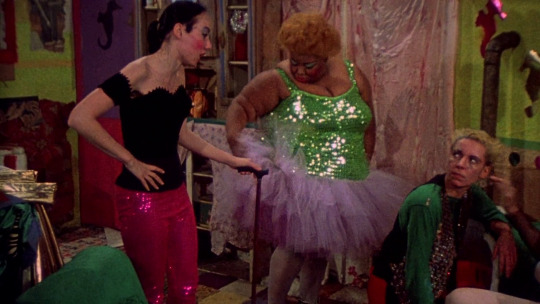




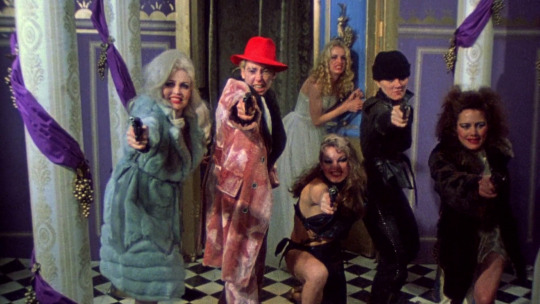
Desperate Living (1977)
#desperate living#desperate living 1977#john waters#mink stole#jean hill#susan lowe#liz renay#edith massey#mary vivian pearce#brook yeaton#karen gerwig#1970s#1977#lgbtq#filmedit#film#cinema#movies
39 notes
·
View notes
Text
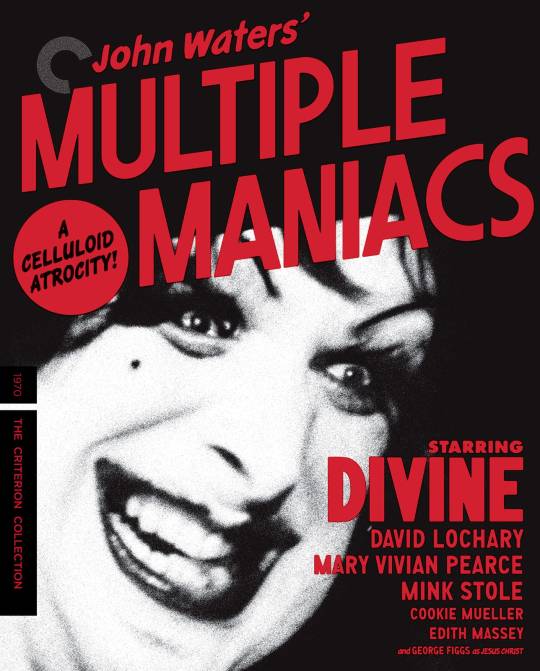
Films Watched in 2023:
84. Multiple Maniacs (1970) - Dir. John Waters
#Multiple Maniacs#John Waters#Divine#David Lochary#Mary Vivian Pearce#Mink Stole#Cookie Mueller#Edith Massey#Susan Lowe#Rick Morrow#Films Watched in 2023#My Post
10 notes
·
View notes
Text
On October 14, 1977 Desperate Living debuted in New York City.

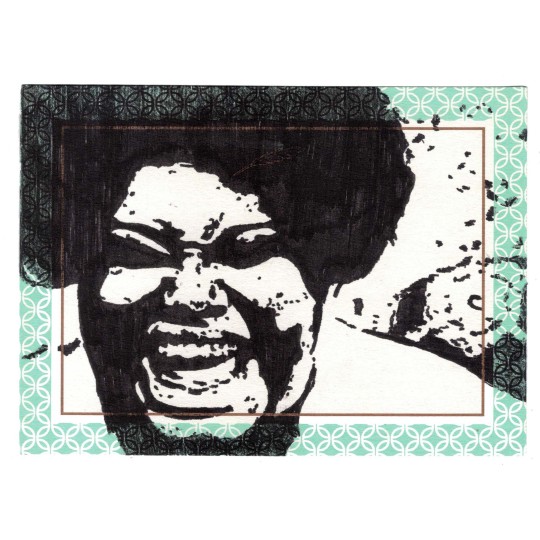



#desperate living#john waters#mink stole#jeannholl#susan lowe#liz renay#trash film#indie film#comedy movies#black comedy#dreamlanders#cult classic#exploitation film#trash trilogy#lgbtq cinema#lgbtq fan art#lgbtq film#art#movie art#drawing#movie history#pop art#modern art#pop surrealism#cult movies#portrait#cult film
4 notes
·
View notes
Text
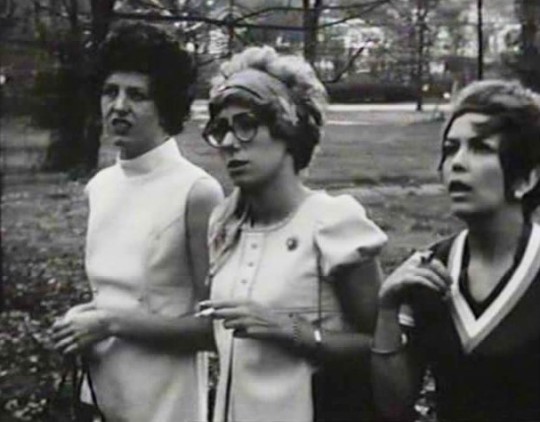
Cookie Mueller, Mink Stole, and Susan Lowe in a scene from Multiple Maniacs (1970) outside the Cavalcade of Perversions, filmed outside John Waters' parents' home in Baltimore.
2 notes
·
View notes
Text
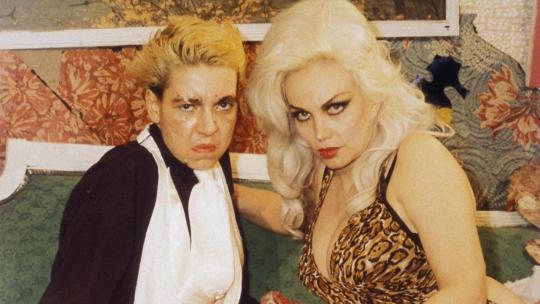
.
Every word I ever utter shall be considered a royal proclamation!
Desperate Living, John Waters (1977)
#John Waters#Liz Renay#Mink Stole#Susan Lowe#Edith Massey#Mary Vivian Pearce#Jean Hill#Brook Yeaton#Karen Gerwig#George Stover#Thomas Loizeaux#Chris Lobinger#Charles Roggero#1977
0 notes
Text
John: "Oh god no"
Arthur: "I just came to pay my respects to the fallen hero"
Not the complete transcript, just the highlight. Grimshaw's line at the end is in reference to if you don't leave John alone.
#rdr 2#arthur morgan#john marston#red dead redemption 2#van der linde gang#susan grimshaw#low honor arthur morgan#lh arthur morgan
55 notes
·
View notes
Note
Hello!! :D

could i possibly request something Autumn Oak/Susan-Linda Stampler please? :3
Thank you so much!! :D have a good day/night and take care!! :]

here ya go!!! i hope you like it! sorry it’s kind of messy lol i hope i did them justice <3
if you VOTE GLENN HERE i’ll do a sketch request!!
#dndads#dungeons & daddies#autumn oak#susan stampler#autumn oak/linda stampler#i was racing against time to get this one done#cuz my ipad and apple pencil were both low battery#im slowly but surely getting to everyone’s requests!! sorry it’s taking a bit :0
73 notes
·
View notes
Text
As the fetus's rights increased, mother's just kept diminishing. Poor pregnant women were hauled into court by male prosecutors, physicians, and husbands. Their blood was tested for drug traces without their consent or even notification, their confidentiality rights were routinely violated in the state's zeal to compile a case against them, and they were forced into obstetrical surgery for the "good" of the fetus, even at risk of their own lives.
Here are just a few of the many cases from the decade's pregnancy police blotter and court docket:
• In Michigan, a juvenile court took custody of a newborn because the mother took a few Valium pills while pregnant, to ease pain caused by an auto accident injury. The mother of three had no history of drug abuse or parental neglect. It took more than a year for her to get her child back.
• In California, a young woman was brought up on fetal neglect charges under a law that, ironically, was meant to force negligent fathers to pay child support. Her offenses included failing to heed a doctor's advice (a doctor who had failed to follow up on her treatment), not getting to the hospital with due haste, and having sex with her husband. The husband, a batterer whose brutal outbursts had summoned the police to their apartment more than a dozen times in one year alone, was not charged —or even investigated.
• In lowa, the state took a woman's baby away at birth even though no real harm to the infant was evident—because she had, among other alleged offenses, "paid no attention to the nutritional value of the food she ate during her pregnancy," as an AP story later characterized the Juvenile Court testimony. "[S]he simply picked the foods that tasted good to her."
• In Wyoming, a woman was charged with felony child abuse for allegedly drinking while pregnant. A battered wife, she had been arrested on this charge after she sought police protection from her abusive husband.
• In Illinois, a woman was summoned to court after her husband accused her of damaging their daughter's intestine in an auto accident during her pregnancy. She wasn't even the driver.
• In Michigan, another husband hauled his wife into court to accuse her of taking tetracycline during her pregnancy; the drug, prescribed by her physician, allegedly discolored their son's teeth, he charged. The state's appellate court ruled that the husband did indeed have the right to sue for this "prenatal negligence."
• In Maryland, a woman lost custody of her fetus when she refused to transfer to a hospital in another city, a move she resisted because it would have meant stranding her nineteen-month-old son.
• In South Carolina, an eighteen-year-old pregnant woman was arrested before she had even given birth, on the suspicion that she may have passed cocaine to her fetus. The charge, based on a single urine test, didn't hold up; she delivered a healthy drug-free baby. Even so, and even though the Department of Social Services found no evidence of abuse or neglect, State prosecutors announced that they intended to pursue the case anyway.
• In Wisconsin, a sixteen-year-old pregnant girl was confined in a secure detention facility because of her alleged tendencies "to be on the run" and "to lack motivation" to seek prenatal care.
Certainly society has a compelling interest in bringing healthy children into the world, both a moral and practical obligation to help women take care of themselves while they're pregnant. But the punitive and vindictive treatment mothers were beginning to receive from legislators, police, prosecutors, and judges in the 80s suggests that more than simple concern for children's welfare was at work here. Police loaded their suspects into paddy wagons still bleeding from labor; prosecutors barged into maternity wards to conduct their interrogations. Judges threw pregnant women with drug problems into jail for months at a time, even though, as the federal General Accounting Office and other investigative agencies have found, the prenatal care offered pregnant women in American prisons is scandalously deficient or nonexistent (many prisons don't even have gynecologists)—and has caused numerous incarcerated women to give birth to critically ill and damaged babies. Police were eager to throw the book at erring pregnant women. In the case of Pamela Rae Stewart of San Diego the battered woman charged with having sex against her doctor's orders—the officer who headed up the investigation wanted her tried for manslaughter. "In my mind, I didn't see any difference between born and unborn," Lieutenant Ray Narramore explains later. "The only question I had was why they didn't go for a murder charge. I would have been satisfied with murder. That wouldn't have been off-base. I mean, we have a lady here who was not following doctor's orders."
Lawmakers' claims that they just wanted to improve conditions for future children rang especially false. At the same time that legislators were assailing low-income mothers for failing to take care of their fetuses, they were making devastating cuts in the very services that poor pregnant women needed to meet the lawmakers' demands. How was an impoverished woman supposed to deliver a healthy fetus when she was denied prenatal care, nutrition supplements, welfare payments, and housing assistance? In the District of Columbia, Marion Barry declared infant health a top priority of his mayoral campaign—then cut health-care funding, forcing prenatal clinics to scale back drastically and eliminate outright their evening hours needed by the many working women. Doctors increasingly berated low-income mothers, but they also increasingly refused to treat them. By the end of the decade, more than one-fourth of all counties nationwide lacked any clinic where poor women could get prenatal care, and a third of doctors wouldn't treat pregnant women who were Medicaid patients. In New York State, a health department study found that seven of the state's counties had no comprehensive prenatal care for poor women whatsoever; several of these counties, not so coincidentally, had infant mortality rates that were more than double the national average. In California in 1986, twelve counties didn't have a single doctor willing to accept the state's low-income MediCal patients; in fact, the National Health Law Program concluded that the situation in California was so bad that poor pregnant women are "essentially cut off from access to care."
-Susan Faludi, Backlash: the Undeclared War Against American Women
#susan faludi#female oppression#prenatal care#low income women#pregnancy#amerika#failed state#court-ordered kidnapping#USA is a society that wants to die#misogyny
47 notes
·
View notes
Photo

Lanvin - Spring 1991 Couture
#fashion#fashion show#lanvin#spring 1991 couture#1991#lanvinspring1991couture#low quality#susan holmes
64 notes
·
View notes
Text









the book of night women - marlon james // bloodsport - yves olade // olivia cooke on alicent and rhaenyra's relationship
#my posting has devolved into nothing but pure vibes at this point#i've had no energy for anything more at the moment my brain is choosing to rebel against me#i was too wiped out to even filter the images at all. just rawdogging the low quality stills from the film#not a song recommendation but i've been listening to 'pagan poetry' by bjork on repeat for like. the past month#and while the lyrics aren't necessarily a fit for them it remains The Current Vibe for these two#like minds#murderous intent#like minds 2006#nigel colbie#alex forbes#nigel colbie x alex forbes#web weaving#quotes#oh my only thought was rewatching the scene where alex clocks him in the face after susan's murder#and nigel says 'feels good to vent one's anger doesn't it jack' and it's like#speaking from experience regarding your father there nigel ?#anyway#i am NOT going to fall into the rabbithole of him confounding love with pain#and the idea that those who supposedly care for you are also those causing you the greatest suffering#because it's all he learned growing up#i am NOT. i have things to do tonight
85 notes
·
View notes
Text
But manner Fanny did not want. Would they but love her, she should be satisfied. Ch 38
Fanny: I just want my family to love me, and since I’m their sister and daughter, I feel like I’ve set a reasonably low bar.
Every member of the Price family except Susan (and William):

#mansfield park#fanny price#the portsmouth scenes make me want to cry#William loved Fanny the whole time so he doesn't really count#but I don't want him slandered here#William price is the best#Susan is great#susan price#jane austen#the bar was so low#and yet somehow no one made it over
67 notes
·
View notes
Text
On May 27, `1977 Desperate Living debuted in Baltimore.


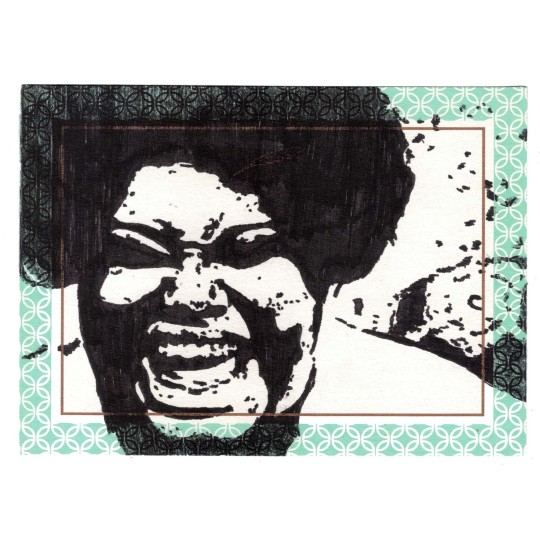




#desperate living#john waters#susan lowe#liz renay#jean hill#mink stole#edith massey#trash film#dreamlanders#lgbtq film#cult cinema#fan art#movie art#art#drawing#movie history#pop art#modern art#pop surrealism#cult movies#portrait
8 notes
·
View notes
Text
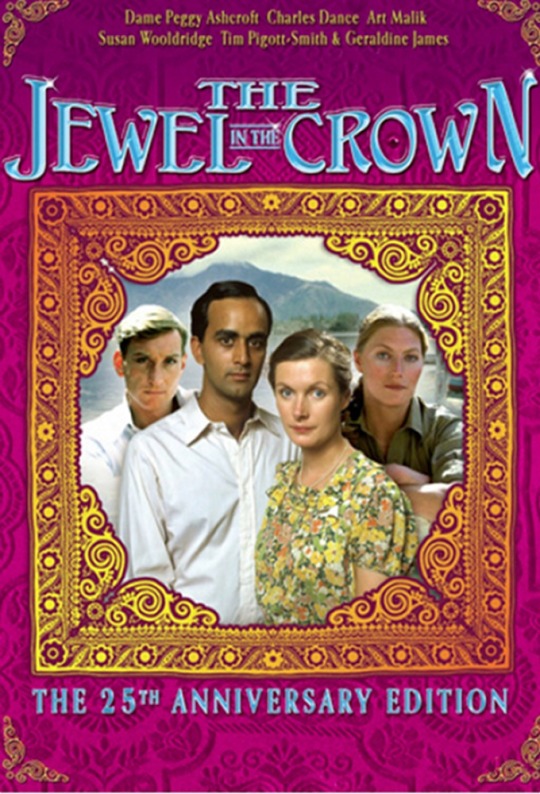
THE JEWEL IN THE CROWN (1984): Frequently interesting, never really satisfying 14-part Granada TV series, adapted by Ken Taylor from four novels by Paul Scott, about the final years of British rule of India (from about 1942 to 1947), set in a fictional province called Mayapore.
The first episode, which is two hours, adapts the title novel, about a young white Englishwoman named Daphne Manners (Susan Wooldridge) whose relationship with an Indian man called Hari Kumar (Art Malik), recently returned to India after attending an English public school, has disastrous consequences for them both, with Hari persecuted and eventually imprisoned at the behest of particularly racist and sadistic local police superintendent Ronald Merrick (Tim Pigott-Smith), a lower-middle-class functionary whose hatred and envy make him determined to put Hari in his place. This is by far the most cohesive portion of the story (although it's not very pleasant and needs CWs for rape and police brutality), and the only one whose main characters are particularly sympathetic, but it ends with Daphne dead, Hari in prison, their daughter Pavarti in the custody of Daphne's great aunt, and Merrick ascendant.
The remaining episodes shift focus to the upper-class Layton family, whose elder daughter Sarah (Geraldine James) joins the WACs after her father (Frederick Treves) a British Army colonel, becomes a German POW. The central figure, though only occasionally the POV, remains the monstrous Merrick, who parlays his avocation for torture into a high-ranking military intelligence role and eventually tries to ingratiate himself with the Laytons, particularly after he loses an arm and is badly burned in a failed attempt to rescue Sarah's brother-in-law following a roadside attack. In the last few episodes, the POV shifts to Guy Perron (Charles Dance, in a rare non-villainous role), another public schoolboy and a former classmate of Hari Kumar's, who becomes Merrick's reluctant aide and has a fleeting romance with Sarah before returning to witness independence as an academic observer.
There is much of interest throughout, but in discarding the novels' epistolary format and placing events in chronological order, the dramatization leaves the story feeling lumpy and occasionally threadbare: Important characters simply disappear and are later casually mentioned to have died, and important plot threads only occasionally have dramatic resolution within the narrative. More vexingly, after the first episode, the story's interest in presenting Indian characters as anything other than minor background figures (often depicted in a demeaning light) basically evaporates; even Hari Kumar is mentioned more than he's seen, serving more as a symbolic figure rather than a character, and the official subtitles never bother to translate dialogue in Urdu, even when spoken by the white leads. The story's ideological foundation is similarly uneasy, particularly as to class — Merrick is a thoroughly vile figure, but while Sarah and Guy both detest him, their contempt for him is based not in his racist brutality, but in his not being of their class and resenting it, and the finale then attributes his sadism to being a closeted gay man. The story's final episodes also strongly suggest that British rule has provided an important civilizing and stabilizing influence that will promptly collapse with independence.
Although the actual plot can't be accused of being especially nostalgic, it's hard not to see THE JEWEL IN THE CROWN as a colonialist apologia, and it's one of those stories that insists on framing other countries and cultures as something that happens to the white protagonists rather than having any independent existence, politically or otherwise. CONTAINS LESBIANS? There is an extremely depressing subplot about an elderly gay missionary named Barbara Batchelor (Peggy Ashcroft), the companion of Sarah's aunt Mabel, whom the family hastens to shut out after Mabel's death. VERDICT: Superbly acted but dramatically uneven and frequently unpleasant, and its politics leave a bad taste.
#teevee#the jewel in the crown#paul scott#susan wooldridge#art malik#tim pigott smith#geraldine james#colonialism#peggy ashcroft#i guess it's *less* racist than the rains came#but this is setting a low bar
2 notes
·
View notes
Note
Psst! What if Ian set Mickey on the kitchen counter and fed him sweets that he picked up from the bakery on the way home?
mickey would love that shit so much. yes husband feed me while i lounge here like a king. feeding each other is a common occurrence in the gallagher-milkovich household they dont even realize its happening that much until theyre getting dinner with the family and everyone (especially lip, hes never letting either of them live this down) is looking at them weird bc they keep sharing their food by feeding it to each other. gallavich being the most obnoxious codependent couple in all of human history 🫡🫡🫡🫡
#theyre allowed to do whatever they want and ill call them a healthy couple#idk to me there's something about mickey feeding ian or them feeding each other at the same time while micks propped on the counter🥺#the question is do they still go the whole way to sweet susans or do they find a well priced hole in the wall bakery by the apartments#they definitely go back to the Southside to buy beer in bulk bc no way in hell is mickey paying those outrageous prices#mickey realizing the milkovich name holds no weight in his new neighborhood 🥺#he cant threaten store owners into low/free prices anymore but he can start fresh w/o everyone being scared of him for his fathers name🥺🥺#asks#anon#anonymous#i had a whole dialogue thing in this post and i accidentally deleted it so goodbye#shameless#gallavich#a.txt
13 notes
·
View notes
Text
"I am crazy, Miss Grimshaw!"
and
"I'm too near the end to change".
Two very different ways LH Arthur can view himself.
#rdr 2#van der linde gang#red dead redemption 2#arthur morgan#susan grimshaw#lh arthur morgan#low honor arthur morgan
23 notes
·
View notes
Text
I'm actually a little sick that they waited until the last season to give ej a real song
#The first line is 'I call my dad but never speak'#HELLO?? This was an apology for the Susan Fine song#**talk#hsmtmts spoilers#Also sick that he hit that low note in for good and it's probably the best he's ever sounded#Like they could've given him a lower part earlier lol#ej caswell
7 notes
·
View notes